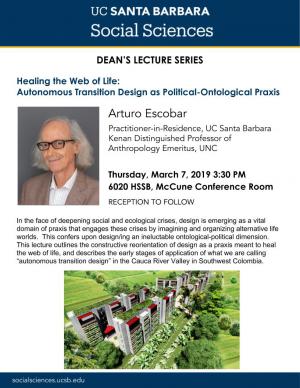Healing the Web of Life:
Autonomous Transition Design as Political-Ontological Praxis
Arturo Escobar
Practitioner-in-Residence (Winter Quarter, 2019)
UC Santa Barbara
In the face of deepening social and ecological crises, design is emerging as a vital domain of praxis that engages these crises by imagining and organizing alternative life worlds. This confers upon design/ing an ineluctable ontological-political dimension. This lecture outlines the constructive reorientation of design as a praxis meant to heal the web of life, and describes the early stages of application of what we are calling “autonomous transition design” in the Cauca River Valley in Southwest Colombia.
Arturo Escobar is Kenan Distinguished Professor of Anthropology Emeritus at the University of North Carolina, Chapel Hill. He is also affiliated with the Doctoral Program in Environmental Sciences at Universidad del Valle (Cali, Colombia) and with the Doctoral Program in Design and Creation at Universidad de Caldas (Manizales, Colombia). He has been visiting professor at universities in Ecuador, Argentina, Brazil, Catalunya, Andalucía, Finland, Denmark, the Netherlands, and England. His main interests are: political ecology, ontological design, and the anthropology of development, social movements, and technoscience. Over the past twenty-five years, he has worked closely with several Afro-Colombian social movements in the Colombian Pacific, particular the Process of Black Communities (PCN). His most well-known book is Encountering Development: The Making and Unmaking of the Third World (1995, 2nd Ed. 2011). His most recent books are Territories of Difference: Place, Movements, Life, Redes (2008); Sentipensar con la Tierra (2014); Otro posible es posible: Caminando hacia las transiciones desde Abya Yala/Afro/Latino-América (2018); and Designs for the Pluriverse: Radical Interdependence, Autonomy, and the Making of Worlds (2018).
News Date:
Friday, February 15, 2019
February 15, 2019 - 9:41am







